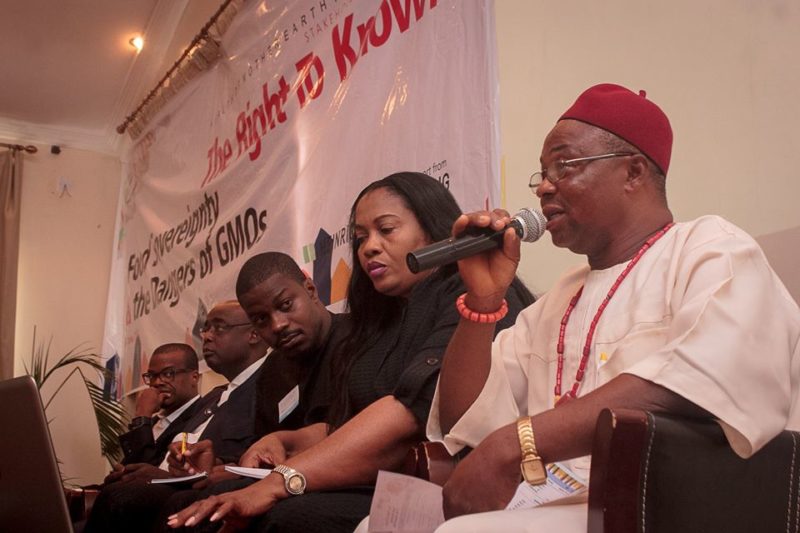Activists have once again called on the authorities to review the National Biosafety Management Act 2015 as, according to them, it cannot in its present form protect the interest of Nigerians.

The call formed one of the numerous resolutions reached at the close of Stakeholders Workshop on Food Sovereignty and Genetically Modified Organisms (GMOs) held in Abuja on Tuesday, June 6, 2017.
Organised by the Health of Mother Earth Foundation (HOMEF), the daylong forum had “The Right to know: Food Sovereignty & Dangers of GMOs” as its theme. It was graced by farmers, scientists, academics, professionals, traders and representatives from the media and non-governmental organisations.
Essentially, the workshop explored issues related to food sovereignty and the rights of the public to have adequate information with regard to safety of the foods they eat.
“The Act leaves loopholes that can be easily manipulated to allow GMOs into the country. An example is the composition of its board which has promoters of modern agricultural biotechnology, including the National Biotechnology Development Agency (NABDA), as board members of NBMA,” the participants emphasised, adding:
“The fact that NABDA teamed up with commercial interests, quickly applied and obtained permist illustarates how this arrangement can breed conflict of interest and defeat the role of the agency as an umbiased regulator.”
The workshop also clamoured investment in independent research, calling on government to invest in research institutes and empower scientists especially those that are not tied to the biotech corporations.
“This will enable them to investigate both short term and future impact of GMOs on the Nigerian environment, her culture and the health of individuals.”
Other resolutions include:
Public Consultation
The needs of the people must be taken into consideration in policy and decision making especially in matters of food which affects everybody. Top down decisions may end up being counter productive. Majority of our farmers are family or smallholder farmers and they are in the best position to say the challenges they are faced with and are capable of sharing knowledge on how those can be overcome without compromising the health of the people.
Loans and grants should be made available to grassroots farmers
Loans, grants and extension services should be made available to farmers, especially those in the rural areas to boost agricultural activities. Increased access to land and tools are essential for improving productivity.
Support for Organic Agriculture
Stakeholders at this meeting agreed that Organic farming is a more sustainable solution for provision of safe and healthy food as it allows farmers to control and save their seeds, enriches the soil and preserves biodiversity. The organic sector of the Ministry of Agriculture should be empowered to provide extension service to farmner.
Seed banks
Organic seed banks should be created in our different ecological zones to safeguard our indigenous seeds and secure our biodiversity.
Provision of storage facilities and access to markets
Focus should be on reducing post-harvest losses by providing proper storage facilities and creating bridges between the farms and the markets. The problem is more of food wastage than of food shortages.
Restrict GMOs to Laboratories
GMOs should be restricted to laboratories. The recall of GMOs after they have contaminated the environment will be very slim. Restriction to research laboratories will protect Nigerians from the health and environmental impacts.
Security agencies to monitor and investigate the uprooting of immature crops
Investigation is required into the uprooting of young plants by unidentified agents in many regions and also the conflicts between famers and pastoralists should be urgently resolved.
GMOs violate human rights.
The issue of GMOs in Nigeria is beyond food. It represents an approach which neglects the rights of individuals to choose and control what they eat. The workshop resolved to demand respect for the rights of the public to safe food. It was also noted that the peculiarities of our context including our informal marketing systems do not allow for standard labelling of products as may work elsewhere and this exposes us to unque risks that cannot be ignored.
Land preparation
Farm produce are as good as the soil and the soil on the other hand is as good as the organic contents in it. To experience good yield and increase productivity, the soil must be carefully managed and protected from chemicals which destroy its natural composition. GMOs and their accompanying agrochemicals negatively impact on the quality of soils.
More agencies to regulate food and biosafety issues
It was also agreed that one agency cannot adequately address the issues of Biosafety in Nigeria. There is need for a strong collective effort to protect our interests, culture, environment and health.
Increased Awareness
The masses are largely unaware of the state of biosafety in the country. A majority do not know about what GMOs are about and how it affects them. One of the strong points made at this event was that of increasing awareness among the people of the dangers of GMOs. We agreed that this information should be spread especially in the rural areas and in languages that the people can easily understand.
Nulification of Permits and other deployments
The workshop resolved that the permits issued by NBMA for GMO varieties (Maize and Cotton) should be withdrawn. The failure of similar GM cotton variety in Burkina Faso and its being banned in that country two weeks before their approval in Nigeria was noted as a cogent reason for concern. The deployment of genetically modified cassava and beans in Nigeria was denounced and participants called for a halt on all fronts.
